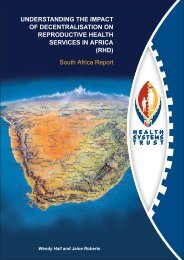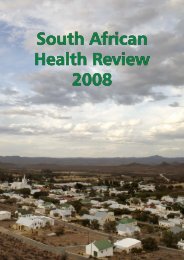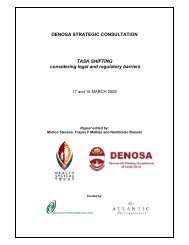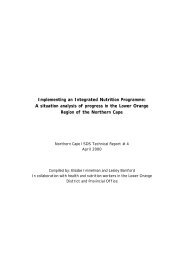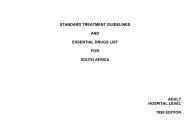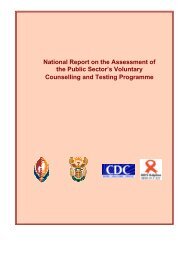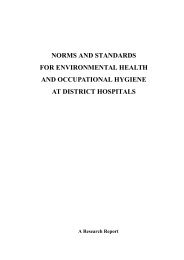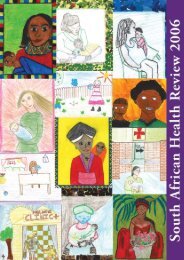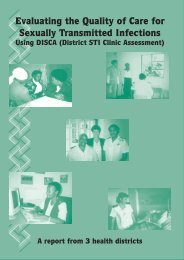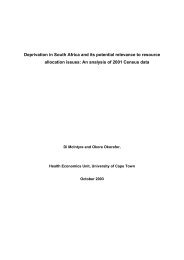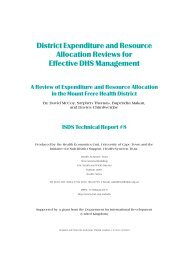SAHR 2007 - Health Systems Trust
SAHR 2007 - Health Systems Trust
SAHR 2007 - Health Systems Trust
You also want an ePaper? Increase the reach of your titles
YUMPU automatically turns print PDFs into web optimized ePapers that Google loves.
Social or National <strong>Health</strong> Insurance 5<br />
that is feasible, affordable and sustainable within the South<br />
African context. This window of opportunity relates to two<br />
key issues:<br />
1. The current planning for a comprehensive social security<br />
system, within which it makes perfect sense to nest a<br />
mandatory health insurance.<br />
2. The fact that government spending on debt servicing is<br />
declining rapidly; while debt servicing was slightly more<br />
than 19% of the total government budget in 2000/01,<br />
it only accounts for 9.5% of the government budget in<br />
<strong>2007</strong>/08. 15,40 During this period, social security, welfare<br />
and other social services and economic services (e.g.<br />
agriculture, forestry, trade and industry, etc.) have benefited<br />
from the declining debt burden through receiving<br />
greater shares of the overall government budget. While<br />
this is widely seen as an appropriate prioritisation of<br />
spending, there is also a strong argument in favour of<br />
securing even a slightly greater allocation for the health<br />
sector, particularly to strengthen public sector services<br />
as the core of a mandatory health insurance system. It<br />
is critical that this be achieved in the period when debt<br />
servicing is declining, as it means that an increase in<br />
the health budget allocation can be achieved without<br />
reducing the share of a competing social or economic<br />
sector.<br />
Although an attempt has been made in this chapter to<br />
critically explore the mandatory health insurance debates<br />
without being prescriptive, the following critical steps must<br />
be taken as a matter of urgency in order to progress with<br />
mandatory insurance in South Africa:<br />
to negative perceptions and what must be done to<br />
address these perceptions.<br />
➤ Proceed with the risk equalisation between individual<br />
medical schemes as soon as administratively possible.<br />
➤ Promote the containment of private sector costs through<br />
direct controls on the supply of services (number<br />
and distribution of private providers and some price<br />
control).<br />
➤ Lay the groundwork for a state-sponsored scheme that<br />
will be affordable and attractive to low and middle<br />
income workers.<br />
➤ Pursue an integrated funding pool (i.e. mandatory<br />
health insurance contributions and allocations from<br />
general tax funding) in the shortest time possible.<br />
South Africa has missed previous windows of opportunity to<br />
initiate a mandatory health insurance scheme, for example,<br />
in the mid-1990s when there was a considerable spirit of<br />
social solidarity and potentially a greater willingness to<br />
accept relatively large cross-subsidies relative to what<br />
prevails presently. We are now faced with one more window<br />
of opportunity and another is unlikely to be presented in<br />
future. This is the moment when we need to reach public<br />
consensus on mandatory insurance. It is our belief that this<br />
can best be achieved by avoiding the past definitional<br />
debates and by instead focusing on the primary objectives<br />
of a mandatory health insurance and identifying how the<br />
key functions of health care financing of revenue collection,<br />
pooling, purchasing and provision can be structured to<br />
achieve these objectives.<br />
➤<br />
➤<br />
Achieve an explicit policy commitment to achieving<br />
a universal, comprehensive basic package of health<br />
care services funded through general tax revenue and<br />
mandatory insurance contributions (as part of comprehensive<br />
social security contributions) in the shortest time<br />
possible.<br />
Institute major efforts to dramatically improve public<br />
sector hospital services, which will require additional<br />
funding from general tax sources in the short-term<br />
(hence the reference to the budgeting ‘window of<br />
opportunity’). It also requires serious reconsideration<br />
of the existing governance model for public hospitals,<br />
including the possibility of granting greater operational<br />
autonomy. Alongside these possible financial<br />
and organisational changes, it is necessary to actively<br />
engage with public perceptions about the quality of<br />
care in public hospitals; to identify what is contributing<br />
Acknowledgements<br />
The authors would like to thank Ermin Erasmus and the editors<br />
for their extremely valuable comments on an earlier draft of<br />
this chapter. Their inputs were greatly appreciated.<br />
85



